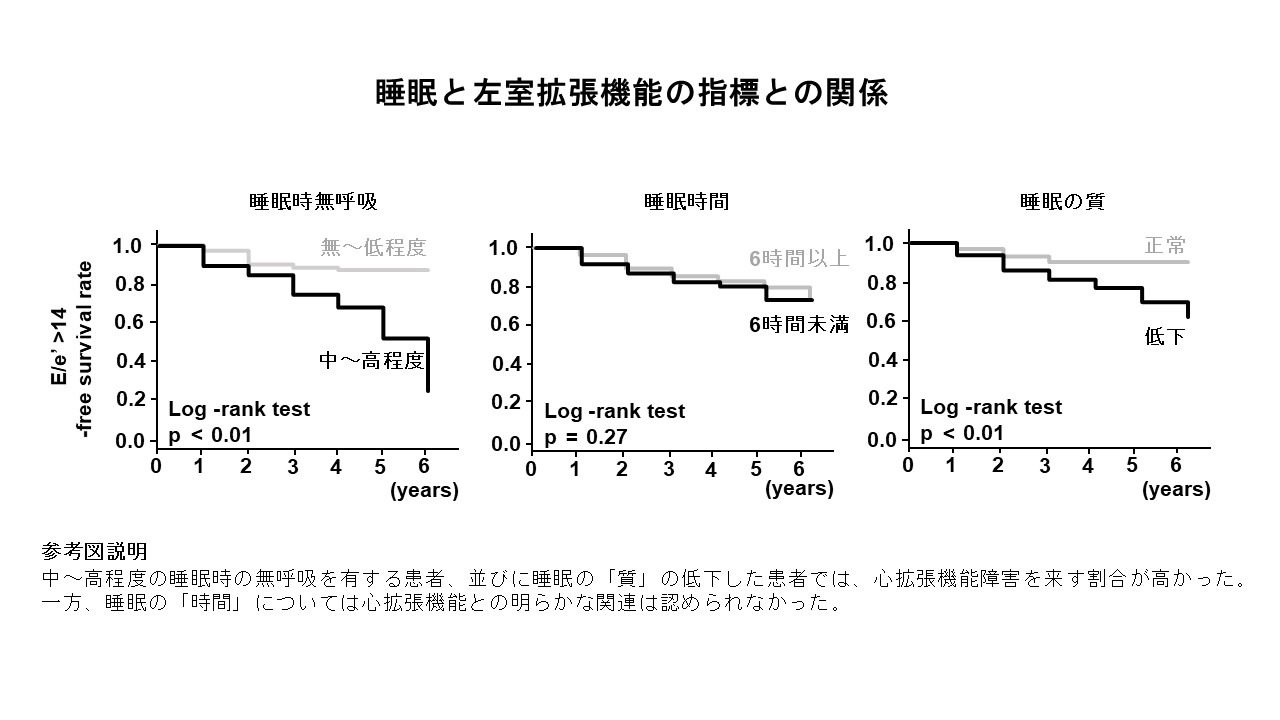Achievements
A medical paper published in the Journal of American Heart Association reveals that sleep apnea and poor sleep quality are important factors in predicting the progression of left ventricular diastolic dysfunction.
A paper summarizing the results of a collaborative study by graduate student Kimawara Yoneichi, lecturer Kakutani Manabu, and chair professor Koyama Hidenori of the Department Department of Diabetes Endocrinology and Clinical Immunology, Professor Daimon Takashi of Medical Statistics, Professor Asakura Masaki of the Department of Cardiovascular and Renal Dialysis Medicine, and Chair Professor Ishihara Masaharu of the Department of Cardiovascular and Renal Dialysis Medicine, was published in the Journal of American Heart Association (September 21, 2022).
The AHA also published an article based on the contents of the paper (Move around a lot while you sleep? It might be bad news for your heart) in their news section.
Please see below for details of the research.
Paper title
Sleep Apnea and Physical Movement During Sleep, But Not Sleep Duration, Are Independently Associated With Progression of Left Ventricular Diastolic Dysfunction: Prospective Hyogo Sleep Cardio-Autonomic Atherosclerosis Cohort Study
Author of the paper
Yonekazu Kidawara, Manabu Kadoya, Akiko Morimoto, Takashi Daimon, Miki Kakutani-Hatayama, Kae Kosaka-Hamamoto, Akio Miyoshi, Kosuke Konishi, Yoshiki Kusunoki, Takuhito Shoji, Akiko Goda, Masanori Asakura, Masaharu Ishihara and Hidenori Koyama
Overview
In recent years, the number of cases of heart failure due to decreased left ventricular diastolic function has increased, and its pathology and risk factors have attracted attention. It has long been pointed out that sleep problems may be related to heart failure, but no studies have been reported that quantitatively evaluate various sleep-related factors such as "apnea," "short sleep duration," and "poor quality of sleep," and directly examine their impact on the progression of left ventricular diastolic dysfunction.
As part of the HIC project, our research group has now demonstrated, for the first time in a prospective study, that sleep apnea and poor quality sleep can independently predict the progression of diastolic dysfunction before the onset of heart failure. This finding demonstrates the importance of sleep assessment in heart failure prevention strategies.
*This research is the result of collaborative research with Professor Takashi Daimon of Medical Statistics, Professor Masaki Asakura of Cardiovascular and Renal Dialysis Medicine, and Chief Professor Masaharu Ishihara.
Research Background
In recent years, the incidence of heart failure has been increasing in Japan. In particular, the pathology of heart failure with preserved ejection fraction (HFpEF), in which the systolic function of the left ventricle is preserved but the diastolic function is impaired, has been attracting attention, and prevention and identification of risk factors are urgent issues. On the other hand, it has been reported that a high proportion of patients with heart failure suffer from sleep problems such as sleep apnea and poor sleep duration and quality, and it has been speculated that sleep may affect the onset of heart failure. However, no studies have been reported to date that quantitatively and simultaneously evaluate these sleep problems such as apnea, duration, and quality, and comprehensively examine how each of them affects cardiac diastolic function at the stage before the onset of heart failure.
Research Methods and Results
In order to clarify how objectively quantified sleep, fatigue, and neuroendocrinological functions such as autonomic nervous function are involved in the development of various metabolic diseases and arteriosclerosis, we are conducting the Hyogō Sleep Cario-Autonomic Atherosclerosis (HSCAA) cohort study at our university as part of the HIC project. Among the patients enrolled in this cohort study, a total of 452 subjects who had not yet developed heart failure were prospectively examined how sleep apnea, sleep duration, and sleep quality are related to the progression of diastolic dysfunction.
Kaplan-Meier analysis showed that patients with moderate to severe sleep apnea and those with a lot of body movement during sleep and poor "quality" were significantly more likely to develop future cardiac diastolic dysfunction. On the other hand, no clear association was found between sleep duration and cardiac diastolic function. In a Cox proportional hazards model that examined the effects of these factors, including patient background, patients with moderate to severe sleep apnea and those with poor "quality" still showed a significant association with future decline in cardiac diastolic function, and furthermore, these relationships were independent of each other.
The results of this study confirmed that sleep apnea and poor sleep quality are important, independent predictors of the progression of cardiac diastolic dysfunction even before the onset of heart failure. This indicates that, from the perspective of preventing the onset of heart failure in the future, it is necessary to pay attention to the degree of apnea during normal sleep and the quality of sleep, and we believe that this has provided extremely important knowledge for the clinical setting in which heart failure is treated.

Future challenges
This study showed that sleep apnea and poor quality are risk factors for worsening diastolic function even before the onset of heart failure. In the future, it will be necessary to examine whether interventions for patients with frequent sleep apnea, as well as interventions aimed at maintaining or improving good sleep quality, can actually contribute to preventing a decline in diastolic function. In addition, basic research is also needed to understand the mechanism by which poor sleep quality affects a decline in diastolic function and how it affects the substance of left ventricular myocardial cells.
Source of research funds etc.
Grants-in-Aid for Scientific Research: JP19K19421 (Kadotani Manabu), JP20K18944 (Morimoto Akiko), JP18K17399 (Kadotani Miki), JP19K19446 (Kosaka Yoshie), JP18K08531 (Koyama Hidenori)
HIC project research funding (Hidenori Koyama)